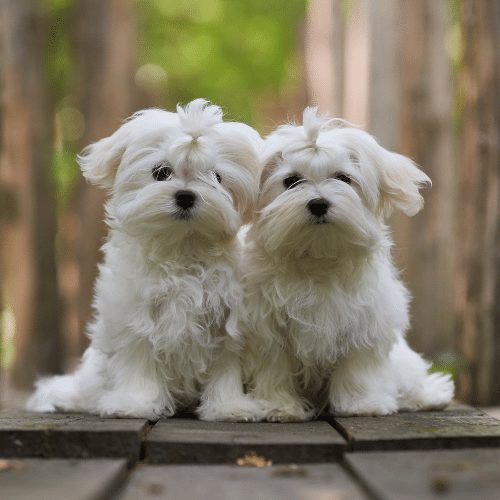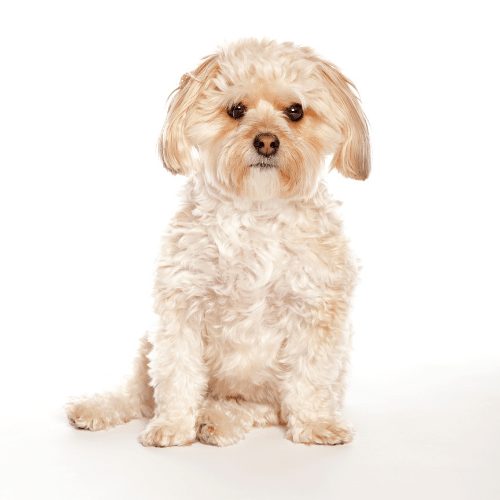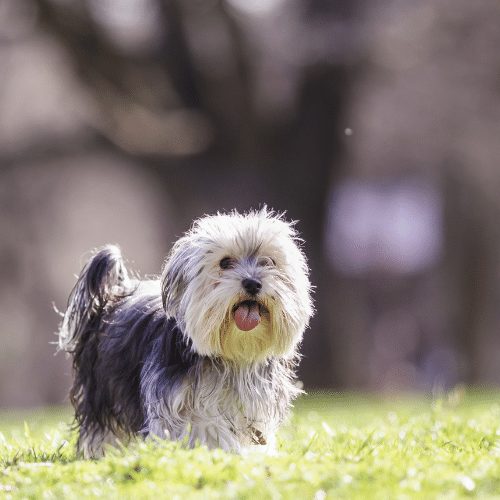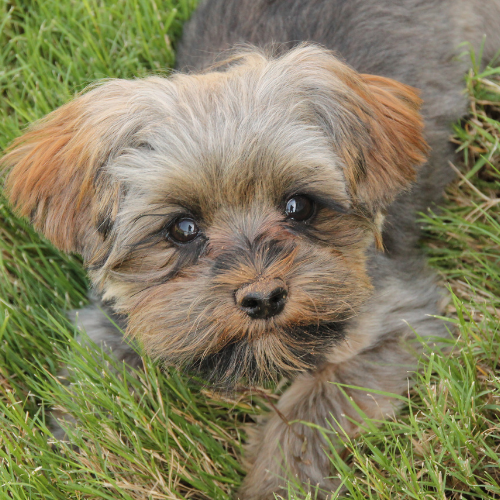Morkies
December 11, 2020 2021-09-23 11:19Breed Overview
Breed Type
Toy Breed
Care Level
Intermediate
Size
Very Small
Trainability
Highly trainable
Sociability & Friendliness
Intelligence
Strength
Family Dog
Physical Exercise Needs
Mental Exercise Needs
Guard Dog/Protection Instincts
Suitability For Dog Sports
Health & Longevity
Grooming Needs
Shedding
Apartment Dog
Suitable For First-Time Owners
Table of Contents

Origin and History of the Morkie
Morkies are a mix of the Yorkshire terrier and the Maltese. Both of these breeds rank high in popularity especially among purebred dogs in the United States of America. Breeders usually choose the best characteristics in each to breed Morkies.
Morkies date back to the ’90s and are originally from the United States. They later came to fame between 2007-2008 and were crowned the most popular crossbreed dog. in the US to date.
Morkies are usually bred for their affectionate, confident, and low hair shedding attributes.
They also go by the names Yorktese, Yorkshire terrier, or Maltese Yorkshire terrier. They are closely related to another popular Maltese cross-breed, the Maltipoo.

Maltese
Maltese are among the smallest toy breeds. They are quite popular especially among those living in apartments. They are also renowned for their white silky straight and thick coat that grows long to the floor. They do not shed a lot as they lack an undercoat making them excellent companions for those with allergies.
Maltese are known for their round skull, black nose, dark alert eyes, graceful tails, and short legs. In terms of their temperament, they are intelligent, affectionate, and very possessive of their owners.
They love attention and can turn aggressive if this is threatened by either other pets or people. This makes them prone to separation anxiety. When coupled with their high energy, it can leave a trail of disaster in the house when left alone.
These dogs are very popular apartment dogs and have become increasingly expensive and sought-after in the last decade.
Yorkshire Terrier
Yorkies are also a popular toy breed among those living in cities and urban towns. They are renowned for their long silky fur that is hypoallergenic.
Yorkies are known for their tenacious, bossy, and brave personality. They fit the description of a big attitude that comes in a small package – even though they are tiny, they are Terrier after all!
Yorkies weigh not more than 7 pounds.


Appearance of the Morkie
Morkies are categorized under toy breeds considering both parents don’t weigh more than 10 lbs. They are often born in litters of 3 or 4 and at times 2. They lack an exact appearance as their physical characteristics depend on the parents. Some may take up morphological features of the Yorkie while others may resemble the Maltese breed. For this reason, Morkies are not recognized by the American Kennel Club.
Morkies weigh between 7 to 10 lbs and stand at a height ranging from 4 to 8 inches at the shoulder. Females lie are on the lower end when it comes to both height and weight. The shorter a Morkie is the less it weighs.
Despite inconsistent breeding patterns, Morkies are known for their silky long single hypoallergenic hair coat. This makes them very popular among people with allergies as they don’t shed. Their coat also varies in color ranging from black, black, and tan (from the Yorkshire terrier parent) or tan, brown, and white (from the Maltese parent). As they age however their coat attains a silver-gray tint.
Morkies have a small round face with a medium-sized muzzle. They have a lean neck and back while the tail has a slight curl.
Temperament
Morkies’ temperaments are hard to predict as they are mixed breeds. It’s therefore preferable to look into the personalities of their parents.
For example, Yorkshire terriers are feisty, bossy, and love to be the center of attention. They are also very agile and won’t tire barking when they notice something strange happening. This makes them excellent watchdogs.
On the other hand, Maltese are affectionate, lively dogs. They however do not thrive in busy noisy households and are rather impatient with loud children.
Morkies love company both from humans and other pets in the households. They have been known to get along with even cats. However, the downside to this is their predisposition to separation anxiety which can cause them to be destructive around the home when left alone or bark/howl incessantly. This makes them not the choice pet for those with busy work schedules unless one seeks the services of a pet sitter.
They make excellent watchdogs a trait attributed to the Yorkshire terrier. They bark at any strange happening in their surroundings.
Playtime should be supervised especially when with larger breed dogs as they can be easily hurt due to their small size.
All in all, Morkies are your typical lap dog. They love cuddles and some chill time, especially in the evenings. They are also pretty active and enjoy a lot of playtime with their human companions.


Grooming Morkies
Morkies have a single hair coat. This makes them less likely to shed and favorable to people prone to allergies. Their hair coat however can grow long to the floor and can be high maintenance when it comes to grooming.
Morkies should have their coat brushed at least once a day to remove any mattes and tangles. Bathing should be done at least once a month with dog shampoo to keep the mane and skin clean, odor-free, and healthy. A trip to the groomers is also a wise idea to keep the length in check at least every 6 to 8 weeks. Hair around the eyes and nose should also be kept short by trimming it with dog grooming clippers.
This helps keep off eye infections as well as avoid respiratory problems in case they accidentally inhale their fur. The hair should also be kept short around the legs and paws to avoid dirt build-up.
This should be accompanied by ear and dental cleaning. The ears should always be kept dry at all times to prevent yeast infections that thrive in moist environments.
Training Your Morkie
Though intelligent, Morkies can be stubborn while training. They respond well to positive reinforcement and play as opposed to negative or repetitive training.
Training should commence when they are young to prevent behavioral problems later in life such as separation anxiety. If one chooses to do this at home, consistency and patience are required. Due to their love for attention, all members of the household should be involved in training. This should however involve the use of a lot of treats, favorite food, and praise as rewards.
Puppy training or obedience school is also a good option. Not only will they get proper training but will also have an opportunity to be socialized with other animals.
Early socializing with other animals, people, new sights, and smells will help reduce their attachment to their caregivers which often causes separation anxiety. It also helps reduces instances of aggression towards new faces and unfamiliar animals.

Feeding Your Morkie
Though small, Morkies have a good appetite and usually finish their bowl of kibble. The amount of food served depends on their age, size, and weight. Small breed dogs usually require 40 calories per pound body weight. With a majority of these dogs weighing an average of 4 to 8 pounds, Morkies should be fed 200 to 300 calories a day in adults or 300 to 500 calories in puppies. This is because puppies should be fed at least 4 times a day while adult Morkies at most 2 times per day.
High-quality kibble is recommended as it also helps to maintain dental health. Do not overfeed your Morkie – by keeping him lean you ensure that your Morkie will live a long and healthy life!
Exercising Your Morkie
Morkies do not require a lot of exercise. They also don’t make the best companions for runs or hikes. On the other hand, they prefer playing fetch or learning tricks just within the home.
Short strolls in the park for at an hour a day are usually enough for them. Many Morkies are very playful with other small dogs. If your Morkie has doggy friends, he can get a lot of exercise through playing with them.
Please do not take your Morkie on strenuous runs or let him run next to your bike. This is not the right breed if you are looking for someone to accompany you while you train for a marathon!

Conclusion
These toy breed mix-breed dogs are becoming more and more popular.
This can be attributed to their hypoallergenic fur and small size. This also makes them one of the best lap dogs to keep especially for apartment living or people living in the city. They are also very affectionate, confident, and intelligent and make excellent watchdogs.
Another reason for making these breeds of dogs popular in big cities is that they do not require a lot of space for exercise. Short walks in the park or some playtime at home are usually enough to keep them active and healthy.
In terms of feeding, puppies should be fed at least 4 times a day while adult dogs twice a day. The amount of food served usually depends on their size, weight, and age.
They love attention which makes them prone to separation anxiety which can be a problem for those with busy schedules. This can often leave a trail of destruction when they are left alone for long periods.
When it comes to grooming, Morkies can be high maintenance. Their fur requires a brush at least once a week to remove tangles and trimmed at least every 6 to 8 weeks at the groomers. Dental and ear cleaning should also be incorporated during bath times at least once every month. This helps to prevent bacterial and fungal infections, dental tartar, and plaque and consequently keeps the skin and fur clean, odorless, and healthy.


